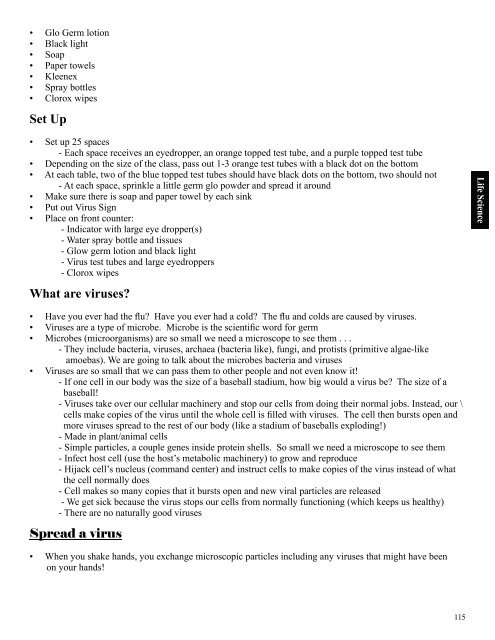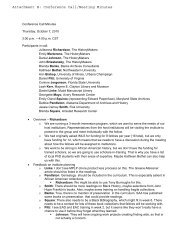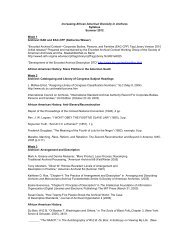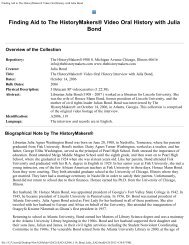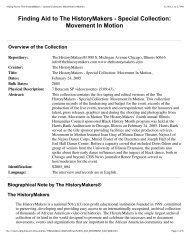ScienceMakers Toolkit Manual - The History Makers
ScienceMakers Toolkit Manual - The History Makers
ScienceMakers Toolkit Manual - The History Makers
Create successful ePaper yourself
Turn your PDF publications into a flip-book with our unique Google optimized e-Paper software.
• Glo Germ lotion<br />
• Black light<br />
• Soap<br />
• Paper towels<br />
• Kleenex<br />
• Spray bottles<br />
• Clorox wipes<br />
Set Up<br />
• Set up 25 spaces<br />
- Each space receives an eyedropper, an orange topped test tube, and a purple topped test tube<br />
• Depending on the size of the class, pass out 1-3 orange test tubes with a black dot on the bottom<br />
• At each table, two of the blue topped test tubes should have black dots on the bottom, two should not<br />
- At each space, sprinkle a little germ glo powder and spread it around<br />
• Make sure there is soap and paper towel by each sink<br />
• Put out Virus Sign<br />
• Place on front counter:<br />
- Indicator with large eye dropper(s)<br />
- Water spray bottle and tissues<br />
- Glow germ lotion and black light<br />
- Virus test tubes and large eyedroppers<br />
- Clorox wipes<br />
What are viruses?<br />
• Have you ever had the fl u? Have you ever had a cold? <strong>The</strong> fl u and colds are caused by viruses.<br />
• Viruses are a type of microbe. Microbe is the scientifi c word for germ<br />
• Microbes (microorganisms) are so small we need a microscope to see them . . .<br />
- <strong>The</strong>y include bacteria, viruses, archaea (bacteria like), fungi, and protists (primitive algae-like<br />
amoebas). We are going to talk about the microbes bacteria and viruses<br />
• Viruses are so small that we can pass them to other people and not even know it!<br />
- If one cell in our body was the size of a baseball stadium, how big would a virus be? <strong>The</strong> size of a<br />
baseball!<br />
- Viruses take over our cellular machinery and stop our cells from doing their normal jobs. Instead, our \<br />
cells make copies of the virus until the whole cell is fi lled with viruses. <strong>The</strong> cell then bursts open and<br />
more viruses spread to the rest of our body (like a stadium of baseballs exploding!)<br />
- Made in plant/animal cells<br />
- Simple particles, a couple genes inside protein shells. So small we need a microscope to see them<br />
- Infect host cell (use the host’s metabolic machinery) to grow and reproduce<br />
- Hijack cell’s nucleus (command center) and instruct cells to make copies of the virus instead of what<br />
the cell normally does<br />
- Cell makes so many copies that it bursts open and new viral particles are released<br />
- We get sick because the virus stops our cells from normally functioning (which keeps us healthy)<br />
- <strong>The</strong>re are no naturally good viruses<br />
Spread a virus<br />
• When you shake hands, you exchange microscopic particles including any viruses that might have been<br />
on your hands!<br />
115<br />
Life Science


